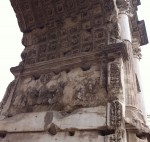Erika Babins, choreographer, and Zach Wolfman, actor, in Awkward Stage Productions’ Titus, written by Andrew Wade and Jenny Andersen. (photo by Corwin Ferguson)
In its sixth appearance at the Vancouver Fringe Festival, Awkward Stage Productions is presenting its first original work: Titus: The Light and Delightful Musical Comedy of Titus Andronicus, written by Andrew Wade and Jenny Andersen.
“Young William Shakespeare wants a hit,” reads the musical’s description. “After cutesy romances and sweeping histories, the young bard is attempting to fold together another blockbuster. He bemoans that no one seems to care for his Titus Andronicus! It seems the violence is not what people want – or at least they won’t admit it. Perhaps it just needs to be presented a little more lightly and delightfully?” Enter Wade and Andersen.
The idea came to Wade when he was acting in a fundraiser production of Titus Andronicus at the University of Victoria.
“I was playing Aemilius and Quintus, and it struck me as so ridiculous how there is a scene where people around him are deciding his fate – accusing him of murder and then sentencing him to be beheaded – and he doesn’t have a single line in his own defence,” Wade told the Independent. “The original play is full of strange, silly moments like that…. During the closing night gathering for that show, I sketched out a one-page brainstorm of ideas if the silly elements to this deeply tragic play were to be highlighted and set to music. I then put that page in a folder and left it alone for four years. And then I pitched the show to Awkward Stage.
“Titus Andronicus has been an excellent vehicle for lampooning [or] sending-up musicals, Shakespeare and our society’s selective obsession with violence as entertainment. The Shakespearean play is so riddled with issues, plot holes and strange character choices, and yet it is also so very, very compelling and touching and human. And what a strange and wonderful musical comedy it turns out to be.”
This is the first writing collaboration between Wade and Andersen, though they have acted together previously.
“While a part of that show,” said Wade, “she mentioned how she might want to write music for a musical at some point.” He made a note to follow up on that discussion and, when he started the first draft of Titus with a different composer and it wasn’t working out, Andersen came aboard, “and our styles clicked.”
“For most of the music, I started by writing some lyrics and sent them her way,” he explained. “Some songs, I added a little voice recording of what it ‘could’ sound like. For others, I included little taglines like ‘sounds like an instructional song from The Sound of Music, but sexier.’ A few of the songs, all I sent her were the words, and Jenny created musical masterpieces from those words, which blew me away.
“And then we would massage the lyrics back and forth for musicality and staging purposes, her telling me I need to cut or add a stanza here or there, me realizing the character needs to elaborate more here and there – a solid, near-egoless workshopping experience. We both dearly treasure what we have created, but we are also both willing to get rid of whatever isn’t working, or fix whatever needs tweaking. I am super-happy with how the collaborative process has gone thus far.”
When Andersen came on board, she said, “a first draft of the book/lyrics had already been written, and I was asked to set it musically.” So, she had no input into the musical’s topic and, she admitted, “a work from the Shakespearean canon would not have been the text I’d have settled on for my first foray into musical theatre composition.”
However, as she has worked with the story, she said, “I’m increasingly realizing the genius in picking this specific play. I think if we had made a musical comedy out of any other Shakespearean work, we would have received polite nods and moderate interest. When we say we’re setting Titus Andronicus as a musical, however, the (nearly universal) response is, ‘That play? How do you make a musical comedy out of that play?!’
“The fact that it’s widely recognized as Shakespeare’s darkest tragedy gives us a few advantages. Of course, people are curious to see how the original text is turned on its ear. More importantly, I think it serves as a statement of what we as a society find funny, what we find acceptable and what we still find as gruesome as we did in Shakespearean times. Why can we often find ourselves laughing at violence, mutilation, murder as comedic tropes, when other issues are still off limits as comedic fodder? Why should any of it be funny, really? What does that say about ourselves as a society?”
Since Andersen came later into the creative process, she said, “For the most part, in my first musical draft, I took Andrew’s lyrics, edited them slightly for smoother musical form/phrasing/syllabic purposes and tried to capture the overall mood of plot and character. We then sat down and parsed out the lyrics to make them universally relevant, to clean up the form and to make sure they were saying what we needed them to say about each situation. For the music, that meant everything from small lyrical tweaks to brand new sections and complete rewrites of certain songs. We went back and forth after that point (often electronically; I think we were in the same room a total of three or four days!) to finesse the flow of the piece. (We literally wrote one of the songs two days before rehearsal started for Fringe!)”
Awkward Stage was created in 2010 “to fill a perceived void of real-life performance and production opportunities for youth in that awkward transition from play acting to professional employment.” As with all its productions, Titus features a cast, crew and creative team “aged 15 to 30ish.”
“Titus has a wide range of ages and experience levels in the show and it’s great to be able to watch them all come together as a cast,” said Awkward artistic associate Erika Babins, who choreographed the musical. “The teenagers in the show are fearless and dive right into the comedic and dramatic high points in the text. During any down time in the rehearsal hall, you’ll find cast members lending their strengths to each other to bring up the overall level of the show.”
When asked about any highlights she could share, she said, “It’s hard to describe some of the funniest moments of choreography without giving away a whole bunch of spoilers but there is a super-serious rhythmic gymnastic dance (as serious as you can be while flitting about with a ribbon), communication through tap dancing, and both life-size and miniature deer prancing around the forest.”
Zach Wolfman plays Bassianus, the late emperor Caesar’s son, younger brother to Saturninus. For the role, he said, “I definitely draw inspiration from my relationship to my brother Jake, who is two years younger than me, and into everything that I’m not – he’s the athlete, sport guy, and I’m the theatrical one. We are both kind of fighting for attention from our parents: my parents divide their time between watching him and my sister in sports games, and me in theatre.
“Professionally, I had a fair amount of Shakespeare training at UBC and through Canada’s National Voice Intensive. It’s fun to examine the Shakespearean qualities that permeate through Andrew Wade’s script, and then go back and look at Shakespeare’s original play.
“I’ve played a lot of wimpy, ineffective princes, who are fighting to prove themselves in some manner or another, and that helps,” he added. “The idealism of Bassianus and the fantasy world that he lives in remind me of a lot of other roles I’ve played – characters falling in love for the first time, young love in a really tender, awkward stage. That kind of new romance seems to breed a certain over-optimistic viewpoint, or rose-tinted perspective in people. Things are new and fresh and awesome, so it’s easy to forget that everyone around you wants to kill you.
“The most challenging aspect of this show is finding the balance between truth and comedy. The show is so fast and funny that you have to fight hard to keep up while you’re laughing. It helps a lot that Andy Toth, our director, is on the side of finding the real heart and truth in this show. Andy opened a rehearsal one day by showing us a great TED Talk by Peter McGraw called What Makes Things Funny. McGraw basically says that, for something to stand out as funny, it needs to step outside of the norm, or background of normal, everyday reality. This show is a roller coaster that goes far off the rails, but is still grounded in characters with real wants, desires and ambitions. Although the show is very dark, at the core, it is a delightful comedy.”
About the most fun aspect of the show, Wolfman said, it “lies in the people I get to work with. Working on this show with three other classmates from UBC is a treat. I feel lucky to be learning so much from Jenny Anderson and Andy Toth every day in rehearsal. Andy drops wisdom bombs left, right and centre and is the perfect person to be directing new work because he asks the tough questions. Andy, Jenny and Erika Babins really bring Andrew Wade’s script to life. Everyone is crazy talented, and I am often in flux between laughter and utter shock.”
Titus is at the Firehall Arts Centre Sept. 10-20. For times, tickets ($14 plus one-time $5 Fringe membership) and the full Fringe schedule, visit vancouverfringe.com.


